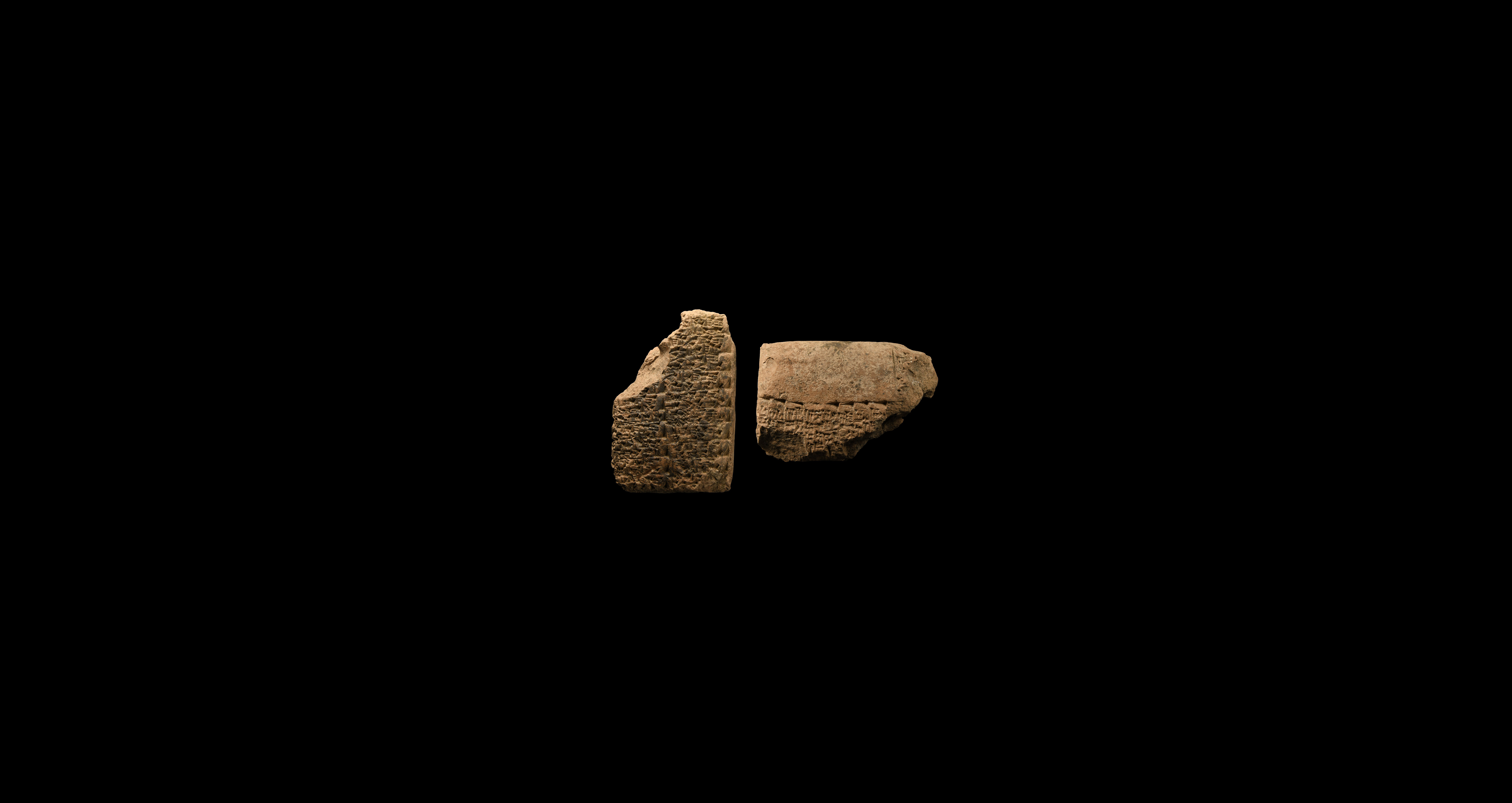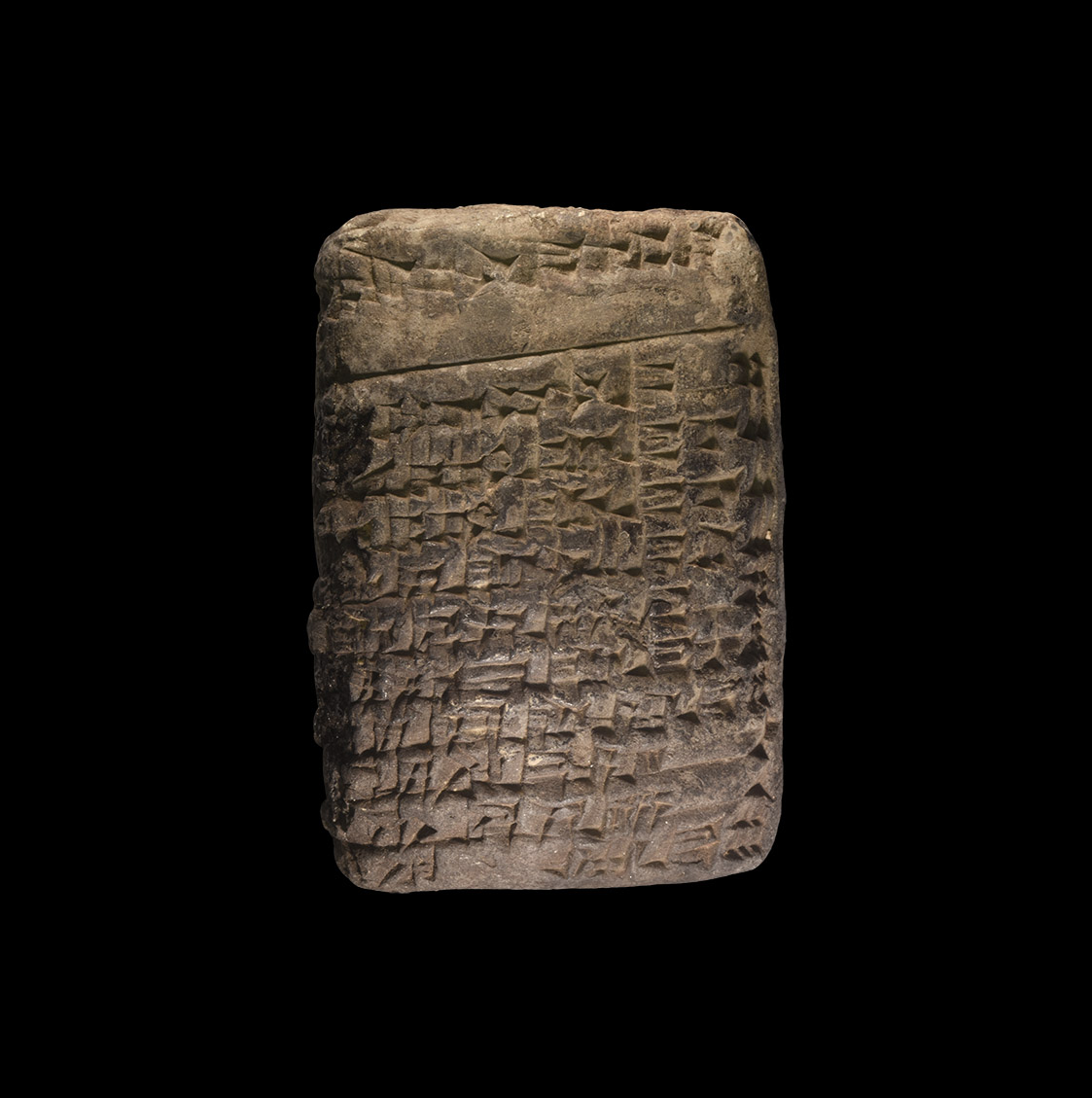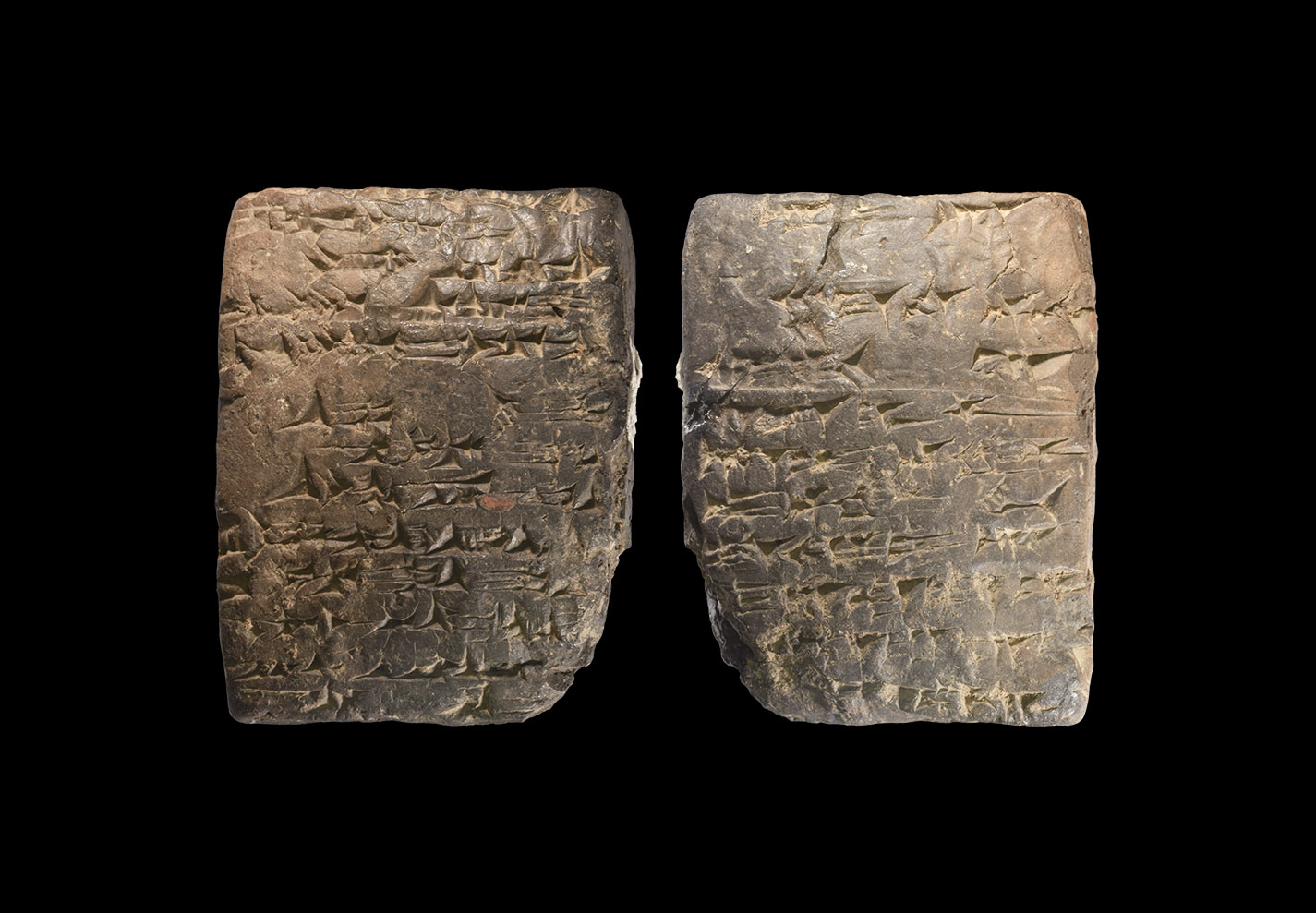AN OLD BABYLONIAN CUNEIFORM CLAY TABLET OF THE UR-ISIN KING LIST ISIN, 1813-1812 B.C. An exceedingly rare source of evidence in one of the earliest known scripts, accounting for centuries of Babylonian royal dynastic rule. 57 x 41 mm. With 21 lines of text on obverse and reverse. Provenance : (1) Ancient Near Eastern Texts from the Erlenmeyer Collection ; Christie's London, 13 December 1988, lot 114. (2) Schøyen Collection, MS 1686. Text : The present tablet lists the kings and regnal years for the Third Dynasty of Ur (which ended in 2004 B.C.) and the First Dynasty of Isin. The list goes down to year 4 of the King Damiq-ilishu who, in fact, reigned for 23 years to 1794 B.C., therefore the tablet was probably written in 1813-1812 B.C. The small format of this manuscript suggests that it may have been excerpted from a longer date list, in which the regnal years of the kings were given their full names. The obverse translates as: 18 years King Ur-Namma 48 years King Shulgi 9 years King Amar-Suen 9 years King Shu-Suen 24 years King Ibbi-Suen 33 years King Isbi-Erra 10 years King Shu-ilishu 21 years King Iddin-Dagan 19 years King Isme-Dagan 11 years Ling Lipit-Estar The reverse translates as: 28 years King Ur-Ninurta 22 years King Bur-Suen 5 years King Lipit-Enlil 8 years King Erra-imitti 24 years King Enlil-bani 3 years King Zambiya 3 years King Iter-pisa 3 years King Ur-dukuga 11 years King Suen-magir 4 years King Damiq-ilisu The hand of Ur-Suen, until Damiq-ilisu Approximately 17 different Babylonian and Assyrian King Lists have survived, some with more than one copy, and mostly in fragmentary or highly worn condition. The present King List is one of the best preserved and oldest examples to have survived from ancient Babylon. The other remaining tablets are all thought to be held in public collections. While scarce, King Lists are crucial tools for demystifying the chronology of the Babylonian and Assyrian Kingdoms. Bibliography: E. Sollberger, 'New Lists of the Kings of Ur and Isin', Journal of Cuneiform Studies 8, 1954, pp.135-6. A.H. Grayson, King List 2, 'Königlisten und Chroniken' Reallexicon der Assyriologie und vorderasiatische Archaeologie , Berlin, 1980, p. 90. K Lippincott (ed.), with Umberto Eco & E.H. Gombrich , The Story of Time , London, 1999, p.255. J Friberg, A Remarkable Collection of Babylonian Mathematical Texts (Sources and Studies in the History of Mathematics and Physical Sciences. Manuscripts in the Schøyen Collection: Cuneiform Texts I) , New York, 2007, pp.233-236. Andrew George (ed.), Cuneiform Royal Inscriptions and Related Texts in the Schøyen Collection ( Cornell University Studies in Assyriology and Sumerology, vol. 17, Manuscripts in the Schøyen Collection, Cuneiform texts VI ), Bethesda, 2011, text 100, pp.206-207, pl. LXXXV. Exhibited: Conference of European National Librarians, Oslo, September 1994. 'The Story of Time', Queen's House at the National Maritime Museum and The Royal Observatory, Greenwich, Dec. 1999 - Sept. 2000.
AN OLD BABYLONIAN CUNEIFORM CLAY TABLET OF THE UR-ISIN KING LIST ISIN, 1813-1812 B.C. An exceedingly rare source of evidence in one of the earliest known scripts, accounting for centuries of Babylonian royal dynastic rule. 57 x 41 mm. With 21 lines of text on obverse and reverse. Provenance : (1) Ancient Near Eastern Texts from the Erlenmeyer Collection ; Christie's London, 13 December 1988, lot 114. (2) Schøyen Collection, MS 1686. Text : The present tablet lists the kings and regnal years for the Third Dynasty of Ur (which ended in 2004 B.C.) and the First Dynasty of Isin. The list goes down to year 4 of the King Damiq-ilishu who, in fact, reigned for 23 years to 1794 B.C., therefore the tablet was probably written in 1813-1812 B.C. The small format of this manuscript suggests that it may have been excerpted from a longer date list, in which the regnal years of the kings were given their full names. The obverse translates as: 18 years King Ur-Namma 48 years King Shulgi 9 years King Amar-Suen 9 years King Shu-Suen 24 years King Ibbi-Suen 33 years King Isbi-Erra 10 years King Shu-ilishu 21 years King Iddin-Dagan 19 years King Isme-Dagan 11 years Ling Lipit-Estar The reverse translates as: 28 years King Ur-Ninurta 22 years King Bur-Suen 5 years King Lipit-Enlil 8 years King Erra-imitti 24 years King Enlil-bani 3 years King Zambiya 3 years King Iter-pisa 3 years King Ur-dukuga 11 years King Suen-magir 4 years King Damiq-ilisu The hand of Ur-Suen, until Damiq-ilisu Approximately 17 different Babylonian and Assyrian King Lists have survived, some with more than one copy, and mostly in fragmentary or highly worn condition. The present King List is one of the best preserved and oldest examples to have survived from ancient Babylon. The other remaining tablets are all thought to be held in public collections. While scarce, King Lists are crucial tools for demystifying the chronology of the Babylonian and Assyrian Kingdoms. Bibliography: E. Sollberger, 'New Lists of the Kings of Ur and Isin', Journal of Cuneiform Studies 8, 1954, pp.135-6. A.H. Grayson, King List 2, 'Königlisten und Chroniken' Reallexicon der Assyriologie und vorderasiatische Archaeologie , Berlin, 1980, p. 90. K Lippincott (ed.), with Umberto Eco & E.H. Gombrich , The Story of Time , London, 1999, p.255. J Friberg, A Remarkable Collection of Babylonian Mathematical Texts (Sources and Studies in the History of Mathematics and Physical Sciences. Manuscripts in the Schøyen Collection: Cuneiform Texts I) , New York, 2007, pp.233-236. Andrew George (ed.), Cuneiform Royal Inscriptions and Related Texts in the Schøyen Collection ( Cornell University Studies in Assyriology and Sumerology, vol. 17, Manuscripts in the Schøyen Collection, Cuneiform texts VI ), Bethesda, 2011, text 100, pp.206-207, pl. LXXXV. Exhibited: Conference of European National Librarians, Oslo, September 1994. 'The Story of Time', Queen's House at the National Maritime Museum and The Royal Observatory, Greenwich, Dec. 1999 - Sept. 2000.















Testen Sie LotSearch und seine Premium-Features 7 Tage - ohne Kosten!
Lassen Sie sich automatisch über neue Objekte in kommenden Auktionen benachrichtigen.
Suchauftrag anlegen